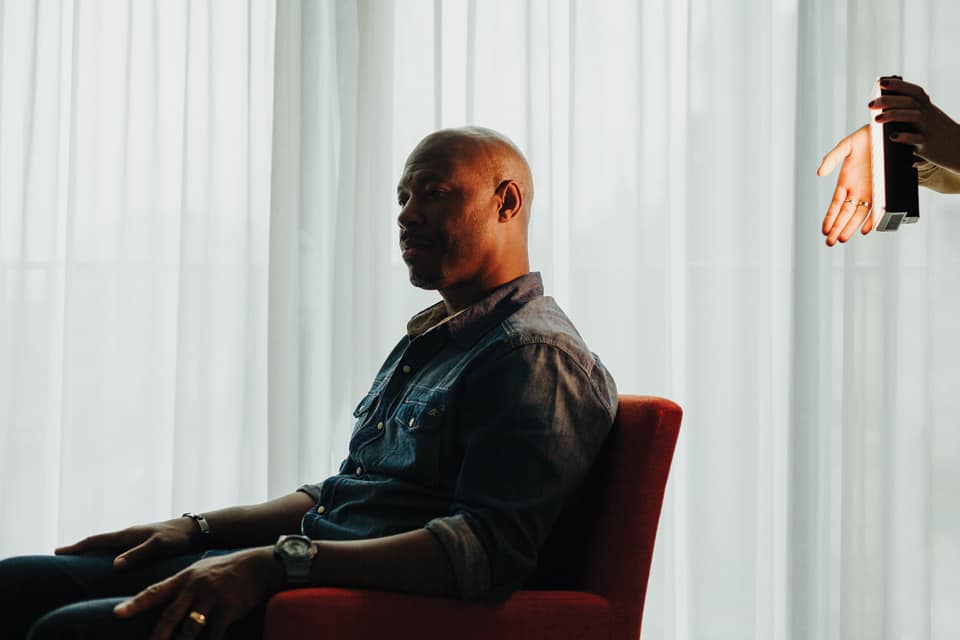Robert Hood’s techno will save your soul
From the magazine: ISSUE 87, August/September 2013
Robert Hood’s latest album as Floorplan, Paradise, is some 17 years in the making. The minimal techno pioneer’s alternate identity dates back to 1996’s Funky Souls EP, though he says the project’s direction didn’t become clear to him until about a decade ago, when he relocated from his native Detroit to Alabama, and found god. Now an ordained minister, Hood says Paradise is part of a larger mission to bring soul searching to the club. The album’s sparse vocal moments don’t contain direct allusions to god, but the project as a whole is a testament to Hood’s faith, and there’s a message of salvation buried beneath its pounding, economical rhythms and soul and gospel samples. He spoke to us by phone from Alabama recently, enjoying a break from a stretch of traveling, doing his best to explain how the word of god goes from his heart to our ears.
As someone whose legacy is established, do you feel any sense of urgency around continuing to release music? It’s more about getting the message out now. I feel a prompting or an urgency to get this message about god and about Jesus out through the music, through this Floorplan album, through the Nighttime World albums, through the Omega albums and so on and so forth. It’s not so much about how I’ve got to get to a certain place of achievement in my life. It’s more about how I’m enthusiastic and hungry and thirsty for the music. But most of all, I’m getting this word out about hope and about paradise and about peace.
How long have you had this outlook? It’s been developing over the years. Actually, I can go back to Minimal Nation [a 1993 EP]. At the time, I really didn’t understand the purpose and the vision and where it was emanating from, but I knew it was spiritual. I really didn’t have the foundation, I didn’t have the learning and the teaching to even begin to understand it, but I knew it was there. So it began to develop over the years as I began to go to church more. Then, later, coming to Alabama and becoming a minister, it all began to come full circle. “What is this music about? What should I be saying with this music?” It’s still coming, the picture’s still materializing, but I have a clearer picture each and every day about what I’m supposed to be doing.
Historically, there tends to be a separation between secular and gospel music. How do you go about combining the two? Well, this is a ministry. A lot of people would say, “You’re a DJ, you’re a techno producer, you’re playing in clubs, you’re playing in bars,” [but] it’s still a ministry. Most people that are going to clubs and going to festivals, they may not get to church. They may not get out to hear the word of god, so my thing is bringing the church to the club. I can go back to The Clark Sisters from Detroit, and the song they did several decades ago called “You Brought the Sunshine,” and how that crossed over into the secular world. Studio 54 and Paradise Garage embraced that song; radio embraced their music. Jesus told his disciples to go out into the world and preach the good news. He didn’t just say, “Keep it to yourself, and if the rest of the world don’t get it, they don’t get it.” A lot of times, religion will separate people and condemn people. That’s not what I want to do. Love is the message. Even though there’s adversity in the world, there’s still good news. That’s why there’s a sense of hope at the end of the day against the dark background.
Why do you call minimal techno “soul music”? Because of its diminutive nature. It’s simple, stripped-down rhythm tracks, and even though it’s focused on minimum structure, it’s focused on maximal soul. The first thing that stuck out in my mind was how devoid of complexity it was and yet how powerful it was. It was just as soulful, as moving and as potent as any Marvin Gaye record. It had the potential and the potency to take you places and put thoughts in your mind, to implant certain pictures and memories and ideas. And that was its genius—that it was so simple that it was able to move planets, to move the earth.
